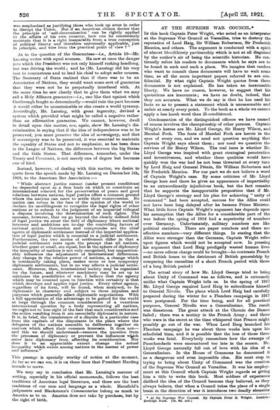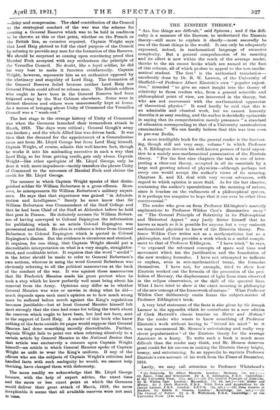AT THE SUPREME WAR COUNCIL.* hr this book Captain Peter
Wright, who acted as an interpreter at the Supreme War Council at Versailles, tries to destroy the
reputation of Lord Haig, Sir William Robertson, Sir Frederick Maurice, and others. The argument is conducted with a spirit of almost bloodthirsty partisanship which is not at all disguised by the author's air of being the scientific historian. He con- tinually refers his readers to documents which he says are to be found in such and such a place. We imagine that readers who want to consult these documents will have to wait some time, as all the more important papers referred to are con- fidential. By what right Captain Wright quotes from these documents is not explained. He has taken an inexcusable liberty. We have no reason, however, to suggest that his quotations are inaccurate ; we have no doubt, indeed, that they are accurate. What we do say is that he has used his facts so as to present a statement which is unreasonable and unfair at nearly every point. To the book as a whole we cannot apply a less harsh word than ill-conditioned.
Condemnation of the distinguished officers we have named of course involves the championship of other persons. Captain Wright's heroes are Mr. Lloyd George, Sir Henry Wilson, and Marshal Foch. The feats of Marshal Foch are heroio in the eyes of every one, and we need not question anything that Captain Wright says about them ; nor need we question the services of Sir Henry Wilson. The real issue is whether Mr. Lloyd George was inspired with great strategical penetration and inventiveness, and whether these qualities would have quickly won the war had he not been thwarted at every turn by Lord Haig and General Petain, Sir William Robertson and Sir Frederick Maurice. For our part we do not believe a word of Captain Wright's case. By some criticism of Mr. Lloyd George here and there he gives an appearance of impartiality to an extraordinarily injudicious book, but the fact remains that he supports the insupportable proposition that if Mr. Lloyd George's strategy and his plan for achieving " unity of command " had been accepted, success for the Allies could not have been long delayed after he became Prime Minister. What little force Captain Wright's argument has depends upon his assumption that the Allies for a considerable part of the war before the spring of 1918 had a superiority of numbers over Germany. Unfortunately, military numbers are like political statistics. There are paper numbers and there are effective numbers—very different things. In stating that the Allies were stronger than the Germans, Captain Wright relies upon figures which would not be accepted now. In pressing his argument that Lord Haig prodigally wasted human lives —no more odious charge could be brought—he contrasts French and British losses to 'the detriment of British generalship by comparing the casualties of a short French period with those of a long British period !
The actual story of how Mr. Lloyd George tried to bring about Unity of Command was as follows, and is extremely unlike what Captain Wright tells us. In the spring of 1917 Mr. Lloyd George required Lord Haig to subordinate himself to General Nivelle. The plans which Lord Haig, had carefully prepared during the winter for a Flanders campaign in 1917 were postponed. For the time being, and for all practical purposes, General Nivelle was a Generalissimo. The result was disastrous. The great attack at the Chemin des Dames failed ; there was a mutiny in the French Army ; and those who were in the secret at the time whispered that France might possibly go out of the war. When Lord Haig launched his Flanders campaign he was about three weeks late upon his scheduled time, and it is possible that the loss of those three weeks was fatal. Everybody remembers how the swamps of Passchendaele were encountered too late in the season. Mr. Lloyd George naturally fell out of love with his idea of a Generalissimo. In the House of Commons he denounced it as a dangerous and even impossible idea. His next step in trying to bring about Unity of Command was the creation of the Supreme War Council at Versailles. It was his employ- ment at this Council which Captain Wright regards as giving him a title to write this book. Most soldiers of experience disliked the idea of the Council because they believed, as they always believe, that when a Council takes the place of a single brain in the direction of war it introduces two deadly elements ' Ai the Supreme War Council. By Captain Peter B. Wright. London: ilveleigh Nash. 17e. dd. net.]
.--delay and compromise. The chief contribution of the Council to the strategical conduct of the war was the scheme for creating a General Reserve which was to be held in readiness to be thrown at this or that point, whether on the French or the British line, as occasion required. Captain Wright says that Lord Haig plotted to foil the chief purpose of the Council by refusing to provide any men for the formation of this Reserve. We should be surprised at coming upon convincing proof that Marshal Foch accepted with any enthusiasm the principle of the Versailles Council. No doubt, like a loyal soldier, he did his very beet to make it function satisfactorily. Captain Wright, however, represents him as an enthusiast opposed by the obstinacy and stupidity of Lord Haig. The formation of the General Reserve failed because neither Lord Haig nor General Petain could afford to release men. The British soldiers who ought to have been in the General Reserve had been frittered away by the War Cabinet elsewhere. Some were in distant theatres and others were unnecessarily kept at home. As a means of bringing about Unity of Command the Versailles Council was a " wash-out."
The last stage in the strange history of Unity of Command was when the Germans launched their tremendous attack in March, 1918. The days were critical ; General Gough's army was broken ; and the whole Allied line was driven back. It was then that the demand for the appointment of a Generalissimo came not from Mr. Lloyd George but from Lord Haig himself. Captain Wright, of course, admits this well-known fact, though he works it into his misleading narrative in such a way that Lord Haig, so far from getting credit, gets only abuse. Captain Wright—like other apologists of Mr. Lloyd George, only he does it with more impudence—tacitly transfers the phrase Unity of Command to the successes of Marshal Foch and claims the credit for Mr. Lloyd George.
The manner in which Captain Wright speaks of that distin- guished soldier Sir William Robertson is a gross offence. More- over, he misrepresents Sir William Robertson's military experi- ence. He says that that experience was gained " in Adminis- tration and Intelligence." Surely he must know that Sir William Robertson was Commandant of the Staff College and that he had been Chief of the Staff at Aldershot before he held that post in France. He definitely accuses Sir William Robert- son of having conveyed to Colonel Repington the information for publishing which in an article Colonel Repington was prosecuted and fined. He cites in evidence a letter from General Robertson to Colonel Repington which is quoted in Colonel Repington's diaries. But the evidence is circuitous and strained. It requires, for one thing, that Captain Wright should put a discreditable interpretation on what is a very simple, straightfor- ward, and creditable letter. It requires that the word " sordid " in the letter should be made to refer to General Robertson's own actions, whereas in using the word General Robertson was obviously referring to all the political manoeuvres at the back of the conduct of the war. It was against these manoeuvres that Sir Frederick Maurice made his great protest when he took a step which he knew perfectly well must bring about his removal from the Army. Opinions may differ as to whether General Maurice was wise or unwise in doing what he did— much depends upon each man's opinion as to how much wrong must be suffered before revolt against the King's regulations becomes justifiable—but at least General Maurice himself felt most strongly that the time had come for telling the truth about the reserves which ought to have been, but had not been, sent to the support of Lord Haig. A reader of this book who knew nothing of the facts outside its pages would suppose that General Maurice had done something morally discreditable. Further, Captain Wright fails to point out when referring abusively to a certain article by General Maurice in the National Review that that article was exclusively a censure upon Captain Wright himself—an article in which General Maurice spoke of Captain Wright as unfit to wear the King's uniform. If any of the officers who are the subjects of Captain Wright's criticism had handled facts with such ambiguity he would, we cannot help thinking, have charged them with dishonesty.
The more readily we acknowledge that Mr. Lloyd George foresaw, with the help of expert advice, the exact time and the more or less exact point at which the Germans would deliver their great attack of March, 1918, the more inexplicable it seems that all available reserves were not sent in tune.



































 Previous page
Previous page